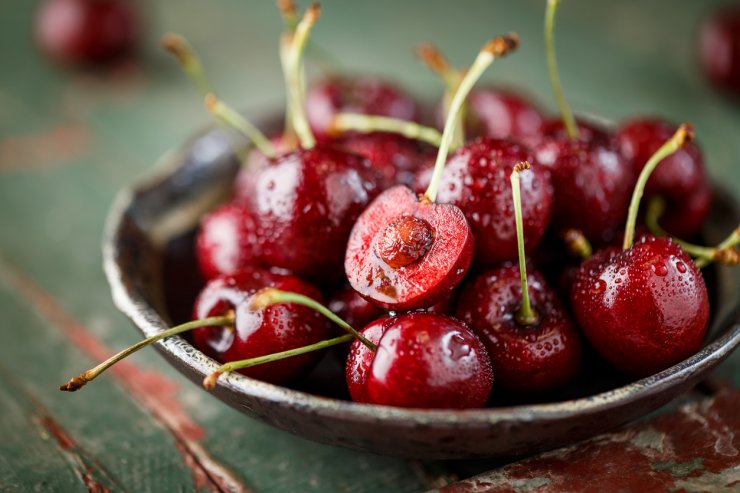
Delicious fresh cherries
Cherries are full of antioxidants. These help your body slow down aging and fight against chronic illnesses, such as heart disease, diabetes, cancer, Alzheimer’s, and obesity.
Consuming cherries can help lower the risk of gout attacks, provide arthritis relief, and protect against diabetes. Eating cherries promotes healthy sleep, helps to curb high cholesterol, and can help reduce post-exercise pain.
Here are ways in which cherries nurture the human body:
Blood pressure
Cherries are a good source of potassium. Increasing evidence shows that a diet rich in potassium may help to control blood pressure and reduce the risk for hypertension and stroke.
Inflammation and Gout
Cherries contain antioxidants known as anthocyanins and cyanidin which may have anti-inflammatory effects, and initial research has shown that these antioxidants could be beneficial in inflammatory conditions such as arthritis, although more research is needed to replicate these results in human studies. Some research suggests that drinking cherry juice lowers the blood uric acid levels (which can trigger an attack of gout) in healthy volunteers.
Sleep
Cherries are a source of melatonin. Melatonin, a hormone produced by the pineal gland, is an antioxidant. It also plays a role in promoting healthy circadian rhythm and thus promoting healthy sleep patterns. Cherries are one plant food source of melatonin. In one study, melatonin supplementation appeared to be effective in reducing jet lag. Consuming sweet cherries in normal serving sizes could prove helpful in promoting good sleep and reducing jet lag.
Alzheimer’s Disease
The anthocyanins found in cherries may help to reduce the risk of Alzheimer’s disease. The effects may also include helping with Huntington’s disease. There is modest research on this subject, on which the jury is still out.
Post-exercise
There has been some research over the years into how cherries, and specifically sour cherries, play a role in exercise recovery. Research by sports nutritionists found that drinking sour cherry juice for seven days before and during a strenuous running event minimized post-run muscle pain. Another small study found that tart cherry juice appears to aid recovery and muscle function after strenuous exercise.
Rheumatoid arthritis
The majority of studies that have looked into the effects of tart cherries on arthritis have focused on osteoarthritis and gout. Given the findings in research, it’s possible that drinking cherry juice—both tart and sweet—may have a beneficial effect on rheumatoid arthritis.
Juice your sour or sweet cherry harvest to add to iced tea, smoothies, and other drinks. Consuming tart cherry juice mixed with other liquids can reduce the significantly sour taste.
Tart cherries are not a cure for rheumatoid arthritis but may provide partial relief for some people.
Did you know that cherries can be so healthful? Please tell us about healthy ways you use cherries.


 Previous
Previous

